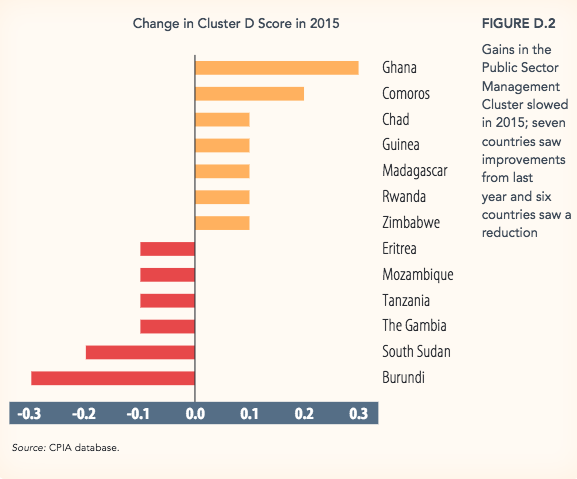The annual Country Policy and Institutional Assessment (CPIA) concluded that governance improvements had slowed across the region.
The report measures progress made by the 38 African countries eligible for support from the International Development Association, the concessional financing arm of the World Bank, across four areas.
These are: economic management; structural policies around trade and business; policies for social inclusion and equity; and public sector management and institutions.
This final sector is also referred to as the governance cluster, and as well as PFM includes areas such as the efficiency of tax raising, the quality of public administration, and transparency, accountability and corruption in the public sector.
The average total CPIA score across these areas was 3.2 out of 6 in 2015, unchanged from 2014. Rwanda was once again the continent’s top performer, registering a 4.0 score. Cape Verde, Kenya, and Senegal all scored 3.8, the next highest, while Eritrea and South Sudan were lowest in the ratings, with slippages in several policy areas edging down their scores to 1.9.
Governance improvements in 2014 had not continued, the review found. Nearly a quarter of African countries saw an improvement in this category last year, but only seven did in the latest examination – Zimbabwe, Rwanda, Madagascar, Guinea, Chad, Comoros and Ghana. Within this, there were gains in the quality of public financial management in Comoros, Ghana, and Madagascar, while PFM performance declined for four countries: Burundi, South Sudan, Tanzania, and the Gambia.
screen_shot_2016-06-28_at_11.12.59.png

Source: CIPA Africa
The review concluded financial management modernisation efforts had aimed to improve the data and information on budget execution for timely and accurate government policy making.
“Efforts have been made to strengthen independent audit and oversight entities, and to develop annual budgets with fiscal year forecasts, budget proposals, and previous year outcomes to facilitate accountable governance,” it stated.
Within the governance cluster, no country increased the quality of public administration, while Eritrea’s declined. Transparency, accountability and anti-corruption in public sector improved in Zimbabwe, according to the review, but fell in Burundi, Mozambique, and South Sudan.
Albert Zeufack, the World Bank’s chief economist for Africa, said the IDA-eligible countries continued to lag behind those in other regions in their policy and institutional ratings.
“Urgent action is needed as more countries are facing downward pressure on the current account and fiscal balances, declining reserve positions, depreciating currencies, higher inflation, and rising debt burdens,” he added.
Punam-Chuhan Pole, World Bank lead economist and author of the report, added that the decline in performance was particularly evident in Burundi and South Sudan.
Did you enjoy this article?
to receive daily news from Public Finance International to your inbox













